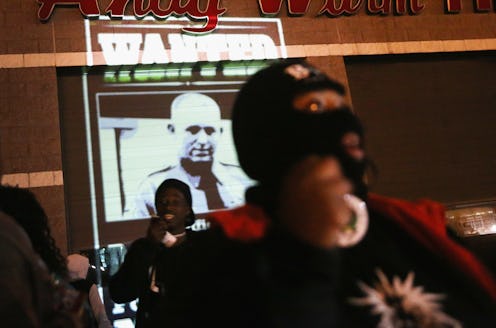News
Here's How Darren Wilson Escaped Charges
If the scenes in Ferguson are any indication, the grand jury's decision to not indict Darren Wilson is not a popular one. Nevertheless, the police officer has been freed of all criminal charges in the shooting of teenager Michael Brown. How exactly they came to that decision will remain speculation, but the most likely explanation is that Darren Wilson was not indicted because the "use of force" law justified his actions, The Wall Street Journal reported. The "use of force" law describes when a police officer is justified in using deadly force during an arrest, but the definition varies from state to state — and the conditions may be inherently flawed.
While it was never in dispute whether Wilson shot Brown, what the jury needed to decide was whether or not he was justified. According to Wilson's testimony, when the officer tried to get out of his car Brown slammed the door on him twice and then punched him twice in the face. Wilson then reached for his gun and warned that if Brown didn't get back he'd shoot. A struggle for the gun ensued, leading Wilson to fire twice. Brown started to retreat and Wilson followed, but, Wilson says, Brown eventually came back toward the officer, even as he continued firing.
At this point it looked like he was almost bulking up to run through the shots, like it was making him mad that I'm shooting at him. And the face that he had was looking straight through me, like I wasn't even there, I wasn't even anything in his way.
Based on this account and other information presented during the 25-day investigation and deliberation, the 12-person jury, which was made up of nine white people and three black people, concluded that Wilson was indeed justified in shooting Brown, which resulted in his death.
What likely informed this decision was Missouri's "use of force" law, which Wilson testified he kept in mind as he encountered Brown. The "use of force triangle" that Wilson says he learned in the police academy likely illustrates the amount of force an officer is justified in using depending on the subject's action. For example, if the subject is compliant, the officer must use cooperative controls; if the subject is assaultive but only threatens physical injury, the officer must use defensive tactics; if the subject threatens serious injury or death, then the officer is able to use deadly force.
According to Missouri's official "use of force" law:
A law enforcement officer in effecting an arrest or in preventing an escape from custody is justified in using deadly force only
(1) When such is authorized under other sections of this chapter; or
(2) When he reasonably believes that such use of deadly force is immediately necessary to effect the arrest and also reasonably believes that the person to be arrested
(a) Has committed or attempted to commit a felony; or
(b) Is attempting to escape by use of a deadly weapon; or
(c) May otherwise endanger life or inflict serious physical injury unless arrested without delay.
The jury likely concluded that condition c) applied to Wilson's case, and therefore justified his opening fire. However, there are many issues with this law, as some of the conditions rely on an officer's judgment. What constitutes "reasonable belief that the person to be arrested has committed or attempted to commit a felony"? Many protesters and activists believe that Wilson used skin color alone to cite probable cause.
Wilson also noted in his testimony that he was already on high alert even before the altercation with Brown, because the Canfield Green Apartments are a known "anti-police area" and a "hostile environment." Which sounds like the kind of preconceived, discriminatory thinking that could have racially motivated Wilson's actions. Despite what happened afterwards and whether or not his use of force was justified, that kind of thinking is the root of the issue. And no doctrine should ever justify racial discrimination.
Images: Getty Images (3)
